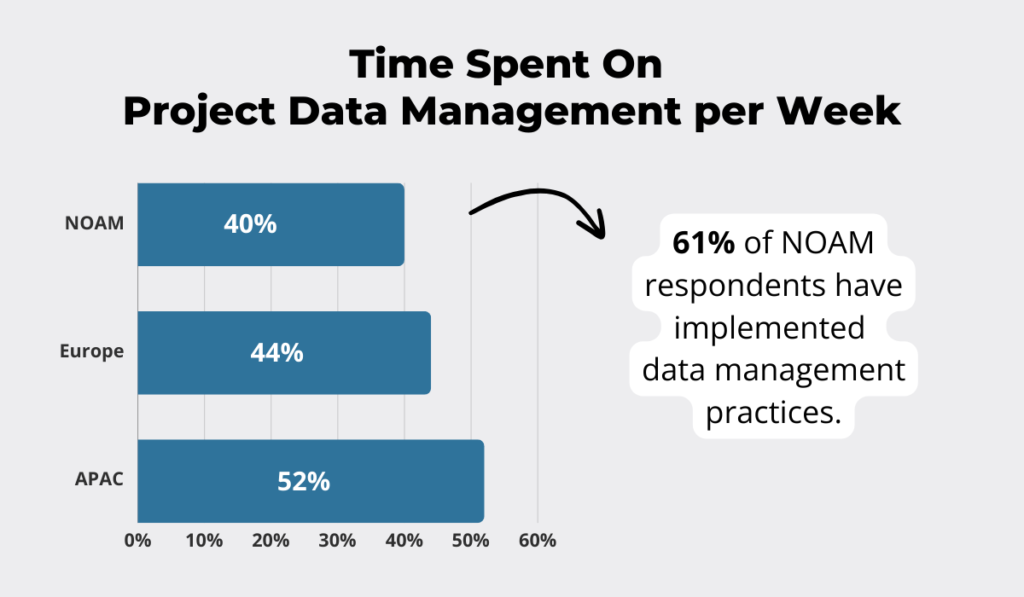Construction project management ensures stability while enabling you to embrace change.
With so many ongoing challenges affecting the construction industry, it remains the most reliable and effective way of dealing with mounting prices, tight deadlines, and emerging risks.
The vital role of project management is indisputable.
However, global circumstances and industry trends are ever-changing.
That is why we’ve compiled 9 recent, must-know statistics that reflect the state of construction project management today.
Want to enhance your decision-making and grow your construction business?
Then join us as we explore these compelling statistics!
In this article...
In 2023, 46% of Engineering and Construction Firms Reported Adopting Integrated Project Management Information Systems Across All Projects
The 2023 Global Construction Survey by KPMG showed an increasing number of engineering and construction (E&C) firms adopting integrated project management information systems (PMIS).
Nearly half of the respondents rely on PMIS for all their projects, and 37% are testing the waters by gradually introducing these systems.
Only 17% of them have yet to adopt any sort of PMIS.

This industry-wide adoption of PMIS signifies a strong push toward digital transformation and all its benefits, and the necessity of improving project visibility with centralized, real-time data.
It also shows that businesses understand that breaking data silos is the first step toward ensuring that collected data has a meaningful application.
The E&C companies that use these systems to enhance their construction project management can collect, analyze, and govern all project data from a single spot.
Ultimately, this leads to improved efficiency, collaboration, and decision-making.
On a more practical level, it means improving various construction project management processes, from initial planning and budgeting to resource management and risk mitigation.
In other words, you’re looking at improved project coordination and informed decision-making across all construction phases.
Project management information systems are considered the essential ingredient of business growth today, so if you’re not on board yet, it’s high time you joined in.
83% of Construction Companies Say Their Biggest Priority Is Improving the Estimating Accuracy of Materials and Equipment
The same KPMG survey asked the companies to rate priority strategies for dealing with disruptive events, such as supply chain uncertainties, cost escalations, and more.
According to the nearly 300 survey participants, the number one priority for countering disruptions is to ensure accurate material and equipment cost estimates.

Neutral responses take up 14%, while only 3% of the respondents view accurate material cost estimation as less important compared to other strategies.
This priority status isn’t surprising, given that much of the project costs are traced back to material and equipment.
As such, resource management and accurate cost estimation are crucial for controlling project costs and timelines from the earliest stages.
This also makes them one of the key features of construction project management software.
Even if we disregard the other listed strategies, it’s clear that contractors want to ensure an accurate breakdown of costs from the get-go, and are no longer willing to bear the brunt of common construction risks.
40% of E&C Firms Say They’ve Missed Budget and/or Schedule Performance Targets Due to Lack of Effective Risk Management
Experiencing budget overruns and missing schedule performance targets may be common occurrences in construction, but that doesn’t make them any less worrying.
KPMG’s recent findings indicate that 40% of E&C firms experienced schedule delays or cost impacts of more than 20% in 2023.

What’s more, while some of it can be attributed to the after-effects of COVID-19, the figures are nearly 10% higher than they were in 2021 at the height of the pandemic.
The sector continues to struggle with delays and poor productivity despite relying on different project management methodologies.
One of the main causes is poor risk management.
Risk management is pivotal in avoiding cost overruns and delays, and anything but effective risk mitigation simply won’t do in today’s construction reality.
The efforts to enhance risk management have led to a new trend of appointing a “chief risk officer”, but risk managers across all industries are also trying to build risk awareness beyond the leadership team.
Maggie Sun, Risk Manager at one of the largest APAC engine manufacturers Cummins, explains that this was her strategy when she initially joined the company.

The increasing number of delays and costly overruns indicate new complexities in managing construction projects.
Fortunately, a greater focus on risk management shows that construction companies know what their course of action should be.
71% of Construction Professionals Think That Extending the Duration of Project Planning Activities Is Very Important for Responding to Disruptions
One final statistic from KPMG’s 2023 Global Construction Survey zooms in on the role of planning in countering project disruptions.
Namely, 71% of surveyed construction professionals say that it’s a crucial part of project managers’ response to disruptions.

This attitude reflects a growing recognition of the importance of proper planning in mitigating risks, which enables:
- improved risk identification,
- better resource optimization, and
- enhanced decision-making.
Risk management depends on systematically identifying, defining, and reviewing strategies to address and manage risks throughout the project lifecycle.
By leaving more time for planning, construction project managers can come up with better contingency strategies.
Consequently, these strategies ensure that projects are more resilient to different disruptions, enabling you to keep your construction work on schedule.
However, while proper planning is important, it has its limits.
Typically, tight project deadlines and budget constraints make it very difficult or unlikely to extend planning for commercial and mission-critical projects.
This is why construction professionals see the duration of planning as a part of a comprehensive risk management framework, rather than a standalone strategy.
33% of Construction Professionals Say That Reduced Costs Were the Biggest Benefit They Experienced From Greater Use of Data
The 2023 report by Deloitte and Autodesk explores the use of data in construction globally, focusing on 12 countries.
Out of the 1,275 surveyed construction leaders, one-third cited reduced operational, project, and material costs as the key benefit of greater use of data.

The focus on cost savings and financial benefits isn’t surprising because it directly tackles the two most common challenges raised by construction businesses today: the costs of raw materials and labor costs.
If the costs are kept in check, project managers can focus on improving other aspects, such as optimizing planning, tracking performance, or improving client satisfaction.
For example, the second-most cited benefit, growing business by mapping projects of interest, can’t be fully realized without first freeing up the funds needed to invest in these new projects.
The bottom line is that investing in data management and analytics unlocks different benefits that reinforce each other, enabling construction companies to step up their game on several levels at once.
As shown by the study, however, many construction professionals value and prioritize achieving cost reductions before moving on to more comprehensive data-driven decision-making.
75% of Construction Industry Stakeholders Agree That Project Managers Need More Autonomy for Rapid Decision-Making
FMI and Autodesk’s 2022 research takes a closer look at how data creates a competitive advantage in times of increasing complexity and tight deadlines.
Project managers are required to make rapid decisions about on-site issues, which is why 75% of surveyed stakeholders believe they need more autonomy to do so.

Since 24% of the respondents strongly agree with this statement, and only 5% show any disagreement, it’s clear that there is a strong, industry-wide consensus here.
Although the research doesn’t reference it specifically, the negative views on more autonomy likely come from worrying about making decisions without prior consultation.
However, project managers are fully equipped to make critical decisions, as long as they have fresh and relevant data.
This access to accurate data is critical, says the unnamed Chief Data and Innovation Officer at one North American general contracting firm:
“Every project we’re on seems to be on an accelerated schedule. […] That’s where having good project data comes into play. It’s the best thing to avoid a bad decision.”
Reducing bottlenecks and boosting operational efficiency are responsibilities of project managers, which is why it’s essential to allow them to make timely on-site decisions.
57% of Construction Professionals Think That Workflow Optimization Will Be the Most Important Project Management Skill in the Future
Despite its focus on the role of data, the FMI report findings also extend to attitudes regarding key project management skills.
Over half of the surveyed construction professionals believe that workflow optimization is the most important project management skill of the future.

Although workflow optimization was the survey’s top-rated answer, it’s interesting to note some regional differences.
For example, construction professionals from APAC countries rated data management strategy as the single most important PM skill, but they included workflow optimization most often.
On the other hand, only 48% of North American respondents did the same.
Regardless of the differences, these answers reflect the growing need for project managers to streamline processes, reduce inefficiencies, and manage resources more effectively.
A key aspect of a PM’s ability to optimize workflows rests on identifying and using software tools that boost efficiency, such as our asset management software GoCodes Asset Tracking.
With GoCodes Asset Tracking, project managers can easily automate and streamline different on-site processes by simply attaching QR-coded labels to all tools and equipment.
Every time a worker scans the QR code to check out a tool, the cloud-based software is automatically updated, with key information available in one dashboard and on all devices.

Besides simplifying the handling of all materials and equipment, real-time GPS tracking provides total asset visibility, boosting efficiency and accountability while countering theft.
Ultimately, workflow optimization improves project outcomes, which is why construction professionals recognize it as a critical project management skill.
Project Management and Field Supervision Staff in North America Are Spending 40% of Their Week on Project Data Management
FMI’s data report also zeroed in on how much time project managers, superintendents, and other field supervisors spend on project data management each week.
It turns out that North American staff are spending 40% of their week managing data, but log in fewer hours compared to construction professionals in APAC countries (52%) and Europe (44%).

At first glance, this may suggest that NOAM construction firms put less focus on data management, but the opposite is actually true.
Namely, the regional variations suggest differences in data management practices and technology adoption.
Since 61% of NOAM companies reported that they use a range of methods and solutions to collect, analyze, share, and archive data, dealing with data management simply takes less time.
Meanwhile, fewer than half of surveyed APAC and European construction companies have done the same, resulting in additional time spent managing data.
These findings confirm that there is space for improving data management practices to save precious time and boost efficiency.
For businesses that want to do the same, exploring the role of automation and data integration solutions is the first step forward.
77% of Construction Firms Reported Difficulties With Filling Project Manager Positions In 2023
The research conducted by AGC and Autodesk analyzed one of the biggest industry challenges: finding and hiring the right talent.
As it turns out, in 2023, 77% of construction firms had difficulties filling project manager positions.
These positions were the second most difficult to fill, right behind superintendents.

The struggles to find skilled workers for both salaried and craft positions are a part of the ongoing global construction labor shortages.
But given the increasing complexity of modern construction projects, the shortage of project management talent poses a significant risk to successful project delivery.
The Project Management Institute’s (PMI) Talent Gap report shows that 25 million project manager professionals are needed to meet global talent demands.

Based on the current industry outlook and growth projections, the construction industry is taking the lead with around 7 million project managers needed by 2030.
These numbers are a wake-up call for construction businesses to improve hiring strategies, introduce upskilling programs, and increase retention efforts.
Conclusion
The recent findings we’ve shared throughout this article shed light on the evolving skill sets and priorities for construction project managers.
They also demonstrate the need for strategic use of data and continuous risk management.
But besides affirming much of what we already know about current challenges, these studies and surveys also reveal the opportunities.
While there are no certainties in business, embracing key insights will empower you to navigate the ever-changing construction landscape.
Keep them in mind, and you’re sure to elevate your construction project management and stay ahead of the curve!









